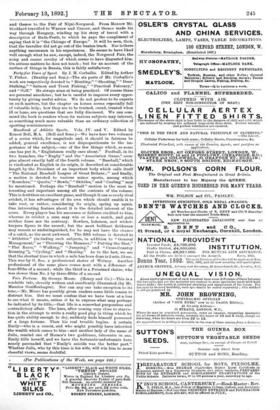Vain Fortune. By George Moore. (Henry and Co.)—This is a
readable tale, cleverly written and excellently illustrated (by Mr, Maurice Greiffenhagen). Nor can any one take exception to its tone,—Mr. Moore has possibly given readers some little reason to distrust him. But we must confess that we have been at a loss
to see what it means, unless it be to express what may perhaps be indicated by its title,—that life is a somewhat purposeless and
contradictory affair. The hero, after coming very close to starva- tion in the attempt to write a really good play (a thing which he has quite ability enough to do), suddenly finds himself possessed of a large fortune. Then his real trouble begins. A certain Emily—who is • a cousin, and who might possibly have inherited the wealth which comes to him—and another lady of the name of Julia, remind one of Horace's two goddesses, laborantes in uno. Emily kills herself, and we have the fortunate-unfortunate hero nearly persuaded that " Emily's suicide was the better part." Whether Julia, who by this time is his wife, will win him to more cheerful views, seems doubtful.


































 Previous page
Previous page